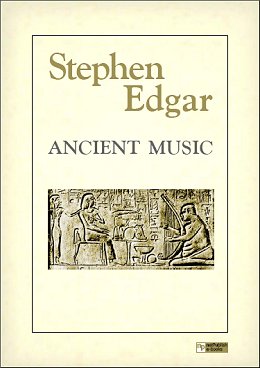Ancient Music

|
Ancient Music was published by Angus & Robertson, Sydney, in 1988. The book is out of print. A used copy might be obtainable through Abe Books or Amazon. There is also a new edition in PDF form, with some textual revisions. The PDF edition (110 pages) is available from the author, price AU$7.50. The format is A5 (148 mm × 210 mm, 5.83 in × 8.27 in); on most printers it will be possible to print pages “2 up” on A4 or US Letter paper. A sample version of the book, containing about a quarter of the poems, can be viewed or downloaded here. Three poems from Ancient Music are displayed on this page.
|
In Search of Time to Come
There’s not much noise above the sputtering fire.
They don’t speak much.
The children are settling to a private croon,
Though the baby whimpers, palping blindly to clutch
At a breast. Farther back, picked out by a
Final index finger of the sun, someone squats.
They’ll be changing their abode quite soon,
No doubt.
The time requires a tacit finishing touch,
From women working at rough pots
And men scraping a hide to peg it out.
This mood, this life, is like a circle, turning
Always back
On itself: expectation interlocking
Ritual; impulse to novelty, for lack
Of its not yet invented learning,
Subsiding again to things that they take pleasure from.
A hum. A mother’s body rocking,
They are, you would say, at home.
Only the cave mouth, that changeable screen,
Opens a gap
In the circumference; and when the light
Is gone, they have no words by which to trap,
Or the notions by which words could mean,
What that black window’s showing for them to detect,
As they look, perplexed, into the night
And stare,
Then turn towards each other’s bodies to tap
Their comfort. Someone, they suspect,
Is out there; and they’re right. We are out there.
Tammy’s Lover
Outside the window where his eyes are aimed,
Though dreams of Tammy leave them blind with love,
The bees go on as they were made to do,
Losing themselves in budding rose, foxglove.
Something, perhaps, in their mechanical hum,
Perfection of performance without thought,
Might have been food for his, but Tammy’s on
His mind just now, reducing it to nought.
He’s got the place refurbished, spick-and-span.
He’s bought a bedspread for the double bed.
He reads (again!) the postcard Tammy sent
Him and her words have whited out his head.
But at last the day arrives. At last he hears
A longed-for vehicle pull up outside
And rushes out with open arms and cheque
To take possession of his precious bride,
Who, in the bedroom, he unwraps and lifts
Out of her box — a woman made in heaven
(That’s what the label says, a Heaven Products’
Money-back guarantee you can believe in)
Computerized and robotized, oh Tammy,
Articulate for love’s work, Tammy makes
All the right noises of encouragement,
The amenable few movements that love takes.
A cunningly placed on-switch sets in train
The intermittent batting of her eyes,
Her gentle thrust, while pressure activates
Her vocalizing program and she sighs.
What did Garance say? C’est si simple, l’amour?
Yes, love is simple. Child of paradise,
He can’t believe that life offers so much,
And all for such a reasonable price.
Solution sweet. He’s even moved to whisper
Sweet nothings in her ear. His passion seeps
Between her plastic thighs, on which one arm
Lies like a dead weight, moveless, while he sleeps,
Having drifted — though he’s failed to switch her — off;
So as she stirs all night by his dreaming face
Her repertoire of moans says yes to air
And her blind eyes blink their thank-yous at blank space.
Metopes
Democratic and surprised divinities,
Plane travellers may see what was never seen,
A sort of inner sanctum, strange
As Tutankhamen’s in the Valley of the Kings,
Hidden in open air: flauntings
Of the Cerne Abbas giant at the skies,
Horses disposed over chalk-etched
Hills; in Peru
Hummingbird and monkey sketched
On the Nazca plain that have only been
Ruts in the desert, but arrange
From a thousand feet a complex living wholeness,
Expressly, you might think, for a viewer’s eyes.
No need to rope in spacemen, though, for this.
Well, then, who?
Torrigiano’s Henry and Elizabeth
Contain and offer, lying in bronze relief,
Such perfectness as can be shown.
Their figures, gilded bronze upon black marble base,
Like sure self-dreaming shadows, face
Above your eyes’ view upwards into death,
Half-seen behind their grille. Why make
Such effort for
The ceiling’s sake? God? Perhaps. But take
The Greeks. Surely they’d long since lost belief
In theirs when they built the Parthenon,
But still went on pursuing an unmatched technique
For obsolete grotesques of early myth,
Occasions now for a tragic rhetoric.
What they hardly saw,
Ranged on the frieze above the colonnade,
Metopes displayed in their restraint and force
Perfection too high to be faced,
Like windows looking through themselves at what they are.
What am I saying? L’art pour l’art?
Perhaps, but there is more. For those who made
Them looked beyond in being bound,
Exceeded by
Means of what’s completely found
Within, like a satellite’s outreaching course
Turning into orbit. So placed,
Like all art holding back even what they’re revealing,
These works show all you need to see. In aid
Of higher purpose God will do, a ceiling
Or the empty sky.
| « Previous | Next » |

